A medic in the Infantry from Normandy to Wells Austria
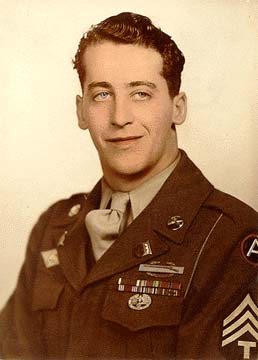
Q. Elmer what's your date of birth?
A. 5-29- 25
Where were you born?
Dearborn Co. Indiana
Where were you living at the time World War II broke out?
Lawrenceburg Indiana
Did you had a job at that time?
I worked in an MGM theatre as an usher.
When did you enlist or were drafted?
I volunteered.
When you went into service, where did you have to report to and what was the date of this?
Dec. 3, 1942 at Camp Mc. Cain / Mississippi.
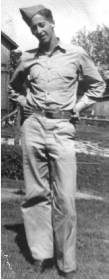
Tell me about your training. How long did it last and what was it like?
12 weeks of hell in the middle of the swamps.
What was your MO? (Method of operation training)
I was in a medical regiment. No firearms.
What was your rank when you went into training and when you came out?
Private in and private out.
Did you have specialized training afterwards?
Surgical training 16 weeks.
After training, were you assigned to another base or post?
If so where was that?
Field manoeuvres at Camp Forest / Tennessee.
Any other posts in the U.S.A.?
Ft. Benning Ga.
Where and when did you go to leave the states?
We left ft. Benning for the port of embarkation Nov. 1943. Boston Mass.
What kind of ship did you cross the ocean on?
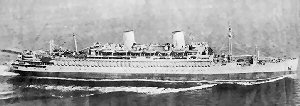
A converted luxury liner USS. Mount Vernon.
Was it just one troop ship or was it a convoy?
A single ship. It was fast enough to outrun the U-boats.
Was it just one troop ship or was it a convoy?
A single ship. It was fast enough to outrun the U-boats.
Any idea how many men were on this troop ship?
6,000 army, and Air Force plus about 600 crew.
Which units were on this ship?
Do not know. The infantry troops were in the bottom decks.
Specialized troops on the promenade deck.
As we went aboard we were issued boarding passes that gave your location and mess times.
The crossing took 3 / 4 days??
Anything unusual happen on your crossing (typhoons, storms ...)?
Nothing except navy gun crews practicing guns and sonar.
Where and when did you land?
We landed at Liverpool UK. Dec. 1943.
Where did you head for when you disembarked from the ship?
London and later to the Midlands at an air field for more training.
How long were you at this particular camp in the midlands?
At Bath USAF base, 4 months.
Besides training, what did you do during all this time that you stayed in the U.K.?
Worked in an aid station, chased girls.
Any anecdotes or special events occurred during that time?
A V1 landed on a pub my girlfriend owned and killed her and her parents.
When did you suspect or were informed about the upcoming invasion in Normandy?
This was constant talk.
On D-Day you were still in England?
Yes sitting in Southampton harbor on the nastiest ship in the British navy, HMS Clough.
Did you know what was going on?
No we were ten days late for the invasion.
When and how did your time in England end?
We sailed 6-14- 44.
Explain what happened next until the moment you set foot on French soil.
Nothing special crossing the channel.
Try climbing down a ships side with a full field pack into a LCVP and both vessels rocking in heavy surf. Very scary. If you fall bye bye.
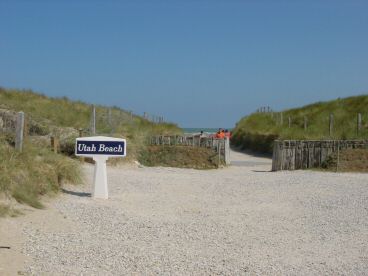
At what time of day on 6-14- 44, did you land on Utah Beach?
We went in early at high tide.
How many men were there in the LCVP?
About 25/30 because we were taking all our personal equipment.
What happened next? Did the ramp come down in the water or on the beach?
We landed farther up the beach because of high tide. The later boats left the guys out in deeper water, knee and waist deep.
Did you encounter any enemy hostility?
No.
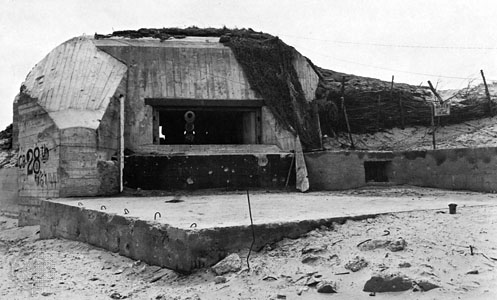
What did you see in the beach area?
One pillbox with a dead German inside. This is the bunker I remember. Facing it we went up a marked path cleared by engineers on the left side. Mine field on all sides. Seems like I remember a concrete trench in the rear and an open door with a dead German inside.
Where did you go after the landing?
We turned right on the road behind Utah and went west, and dug in a field that night. Our first experience with artillery shelling came that night. We had one man killed and several wounded. This is bad in a special trained unit like ours. Hard to replace a medic, takes much special training.
Valognes was the first French town of any size that we entered behind the infantry. We had been dug in close to an old Napoleon watch tower.
Note: Valognes was liberated on 6-18 or 6-19- 1944.
You were with the 467 med. Col, Co. Is this correct?
Yes. At first we were attached to the British 1st Army, then to the US 3rd Army. During the invasion all troops were under British command. Then the American 1st Army was formed. Then the 3rd Army under General Patton. We were then attached to the old 30th Corps. As service personnel we were with many outfits I no longer remember.
I did some searching on Google about the 467 Medical Collecting Company, the unit you were in, but found nothing?
In 1942 my unit at Camp Mc Cain Mississippi was titled the 331 Medical Regiment. After basic training the regiment was renamed; the first battalion was the 467. The second 468 and the third was 469 Med. Coll. Co. I have no idea of the other two battalions. The US Army is: three Co. = 1 batt., 3 batt. = 1 regiment, 3 regiments = 1 division, plus support units. We were a support unit as needed.
I've tried finding what happened to the unit. I left it in Jan. 45 attached to Co. A and B. 417 Inf. Reg. 76 Div. I ended the war with the 64th Medical Reg.
It appears to me there were several medical units.
To name a few: Medical Ambulance Company, Medical Collecting Company, Medical Clearing Company, and several more. What was the task of the MCC?
They furnished the inter ambulance service between battalion aid and field and general hospitals.
Did you also take care of the K.I.A. or was this done by other units?
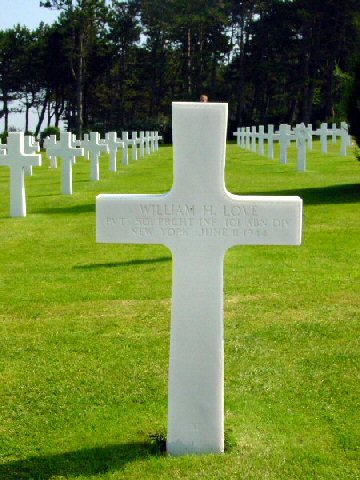
Gravesite of Pvt. William Love at the Normandy American Cemetery in France.
New York June 11, 1944
An American cemetery was begun at Sainte Mère Eglise.
The work was done by German POWS. I hauled several bodies there. At one trip I found a school friend from home. He had been a paratrooper that had surrendered with seven other troopers; they had all been shot in the back of the head. William Love was the friend's name.
Please describe your task on the battlefield.
To aid and remove the wounded to a safe area in the rear battalion aid station. To return to the company any replacements. At later times this was a little known big problem.
Please describe a bit further this little known big problem.
This is a problem I was involved in first hand.
After the Battle of the Bulge, infantry replacements were about zero.
Before Dec. 16, 1944, it was thought by top brass the European war was over, just mopping up operations. All reinforcements were scheduled for the South Pacific. Our infantry campanies were about third strength.
The bottom of the barrel was scraped for replacements by bringing USAAF personnel from England.
I would go to battalion and pick up our allotment. Maybe 8/10 these men were in dress uniforms, no weapons or battle equipment. I had to take them to battalion supply and outfit them.
These men were cooks orderlies and mechanics and knew nothing of combat. They would ask when they would eat or where they would sleep. They didn't know how to dig in for the night. The more tragic thing is the company old timers wouldn't associate with them. New men could get you killed under fire. Any incoming fire and these men would run to the rear. They had no idea what to do, and we didn't have time to teach them.
This was a top brass mistake that could have lost us the war.
Infantry companies were 180 men, three platoons. We were down to less than half the company strength.
You are in Normandy at the Contentin peninsula.
Did you sleep in tents, barracks or perhaps trucks?
Pup tents where possible, or barns or foxholes.
What's a pup tent?
A two man canvas shelter, each man carries half. It rolls up into a tight package; two such tents can be joined making sleeping room for four.
During the advance trough France, did you've ever slept in a bed?
Never slept in a bed, but enjoyed a frolic with a few girls in such place.
Did you also drive an ambulance?
I started to be a driver in basic training, but I had family in medical practice. That qualified me for advanced training in surgery. Most of my duty was on site, bandaging, morphine injections and litter bearing.
St. Lô was the first big city on your advance trough France.
What do you remember of this place?
It was a pile of debris. Nothing much alive but rats.
St. Lô changed hands twice, our armor had to detour around the place.
This was a forerunner of the problems we encountered in Germany.
My personal observation is that indiscriminate bombing did nothing to shorten the war. It made the Germans mad and they fought harder. I am against all such tactics.
Do you remember any other places in-between St. Lô and Paris?
Just people watching in little towns, some offered cognac.
Slow travel by daylight. We dug in at night and our infantry, would advance a few hundred yards and dig in.
The guys would explore close farms and homes and would trade cigarettes and candy for wine and other things. I'm sure your aware what soldiers crave most.
In what way did you advance across France?
I was attached to the 4th Armored Division. I rode half tracks or jeeps. Armored infantry also rides in half tracks.
Does anything stand out in your mind as you travelled across France?
I remember a farm house and a dying woman giving birth.
And another place that was so impossible to forget.
Chateau de la mort, east of Paris.
The battlefield at Verdun and how it was enclosed by barb wire and warning signs of unexploded mustard gas shells from WW I. During training we used gas masks and were taught chemical warfare. We threw the damn things away when we got to France. However these signs made us think.
Explain me about the chateau.
I was with a recon team; as such you search for an easy fast route.
We stopped at this chateau to check it out. There should have been French citizens to welcome us, but the Wehrmacht hadn't retreated fast enough and we came under fire. Our artillery destroyed the place and all that was in it.
I suppose you always operated close to the frontline?
The frontline is an old WW I statement. In WW II the frontline was so fluid, you couldn't really establish one. The Germans would fall back during the day and dig in at night. Mostly we followed and once in awhile have a fire fight if we got to close to their rear guard. This preserved most French, Belgian and Luxemburg towns from demolition. The retreat slowed and stopped at the German border. This is my view.
How much pay did you receive as a soldier?
Private 1942 - 21 dollars a month. 1943 - 50 dollars a month. Overseas duty an extra 10 dollars a month. At discharge in 1946, as Tech. Sgt. I was paid 90 dollars a month. Any tech ratings were to make pay equal to regular army pay scales. Tech ratings had no authority except in your trained field. Actually a PFC had authority over us.
Next stop Paris?
We did stop and allow the French Armored Division to pass us and capture Paris. Where I was stationed the Eiffel Tower could be seen.
When you were on leave, did you visit Paris?
Yes twice, 7 days each time. Loved every minute of it.
A carton of cigarettes sold on the black market paid for all the girls and drinks. We ate and slept in USO facilities.
What happened after the liberation of Paris?
I was in the 3rd Army. I remember passing Metz and the area east of there.
When we started running out of supply's I was transferred north to Belgium and ended up attached to the 28th Infantry Division.
Does something else stand out in your mind?
During our push we used FFI as guides and scouts.
I remember one guy we named Henri. We lost him somewhere along the Meuse river. See the poem Au Revoir Henri at my site. http://www.gildasattic.com/ehake.html
You told me your company was one of the first who liberated the Natzweiler - Struthof concentration camp in the Vosges mountains. Was this before you entered Belgium or afterwards?
Before. We followed an infantry company into the camp. I remember going up a road past a shooting gallery on the left side. A little farther a forest began on the right side, several dead SS lay at the edge, killed by infantry scouts. At the top of the hill the road ends at the camp gate. We were assigned to give whatever help to the inmates. We may have been there a week. Then went to Belgium.
I did a search on the internet about the Natzweiler - Struthof camp.
I've read that this camp was liberated by the first French army at November 28, 1944. According to the site I've visited, there were no prisoners left. Already in September 1944, the Germans had moved the prisoners to subcamps in southern Germany.
I researched this also, this is French bull crap. This camp was liberated by the US 3rd Army units. We the 467 attended the prisoner wants. This wasn't a liquidation camp but a camp of criminals from throughout the German occupation. I did not see a gas chamber; to the left of the main gate were burial pits. I personally watched the removal of dead prisoners being interred there.
The inmates raided the countryside. When we asked the French for help they had none to offer and we were relieved and sent to Belgium. We left the gates open and about 900 prisoners still inside. I signed an article for the French about this. They made this camp a scenic stop after the war. The U.N. gave them funds for this. When we left here we were trucked to Arlon and assigned to different units. That's when I was in the Huertgen.
From Metz and the Vosges mountains you head to Belgium.
Do you remember any places and dates in Belgium?
We were resupplied at Arlon, and assigned to a Corp in or around Huertgen.
You enter the Huertgen forest area just before the start of the Ardennes Offensive (The Battle of the Bulge). Do you have any recollections about that time in the Huertgen?
We gave medical service to many units. I remember being attached to a company that lost 50 % of their people. In the Huertgen were the most casualties I attended too. I recall a Sherman tank burning on the Kall Trail. I tried to get the men out but couldn't. I remember a convoy of wounded moving out of the area, I think to a field hospital? at Arlon.
I was with an infantry unit being pulled back when the Bulge began.
In the Huertgen, a wooded hilly area with ravines and streams, the enemy was always close. You kept yourself hid as much as possible. You moved fast in a bent over position; a sniper might be only a hundred yards away. Hence you only observe what's going on in your immediate area. You need everything your senses and your training has provided you with. I much prefer open ground, you advance standing up and your vision is much better. Your artillery prepares your front. The enemy stays out of sight, hidden in their trenches. They retreat when your shells start hitting their works. Generally armored infantry advances behind the tanks.
Please describe the weather conditions in the Huertgen?
Mostly cold and wet, cloudy.
You were pulled back when the Battle of the Bulge began?
We were running hell bent for election.(*)
After Dec. 16, first back to Bastogne, then south toward Arlon.
(*) meaning running away as fast as you can
I did a search on the internet about the relief of Bastogne.
We were on the outside ring.
We managed to escape Bastogne before it was surrounded going to the outer ring south of town.
You were relieved at Dec. 27, 1944 by units of Patton's Third Army.
That's right. I had three little girls I had found and took them to Arlon and turned them over to the Red Cross. One of the little girls could be Raphaele Dechirante. We are very close now. The other two girls can't be found. Too many years have passed.
What else do you remember about this period Elmer?
Very little. In combat all you know is what you see going around you.
I do remember a thousand bombers passing over us going to bomb the Saar and Rhineland. This something you can't forget. A thousand four engine bombers make a hell of a racket. You hear the fighter planes diving and their guns firing. I saw one plane on fire and saw parachutes falling. Heard a plane dive and fire and heard and saw a B17 explode. The USAAF say's this can never happen, but I saw it.
Tell me about the Sauer Crossing and Germany.
We Co. A and Co. B 417 Inf. was attached to the 28th Inf.Div. Under command of General Cota, a poor stupid planner. He set up a night crossing of the Sauer between Grd. Duchy of Luxembourg and Germany. No artillery preparation. It was a full moon and snow on the ground. We were in full view as we carried the assault boats to the river. The Germans tore us to bits. A Company lost 130 men and B Company lost 135. The two companies had the largest casualty list of any American infantry unit in any 24 hour operation in WW2. A normal infantry company has 180 men. We were down to 55 men.
We crossed from Luxemburg into Germany at Echternach Luxemburg. The city on the German side was named Echternacherbrück. We crossed downstream from the cities. When we got across the river, German shells were already falling. I think 4 of 5 boats were destroyed, throwing occupants in the freezing cold water. More men drowned than died of shellfire. When the 12 of us reached the east side we started running across an open field to the hill about a half mile ahead. We never even thought we were running through a mine field. We found an unoccupied bunker the Germans didn't have time or men to occupy. This was bad because above us was trench's of Germans looking down our throats. About 30 of us finally wedged our way inside. I had a couple wounded to take care of. When one died I had a couple guys help me push him out a gun port. This pillbox was about 15x20 foot and there were 30 of us inside. An officer said he would have me court martial for dropping the body out the window. But I was trained to remove the dead out of view. We were rescued by 10th Armor tanks a day later.
What was left of A & B Company returned to the 76 Div.
More on this at this URL: http://www.angelfire.com/wv/worldwar2/1stbtlnhistory.html
Someplace in the Saarland, four of us in a jeep couldn't cross a major road because the 10th Armored Div. was passing. It takes about 8 hours for the armor to pass any point. So we had to wait in a courtyard at the crossroads, which was under shellfire from German lines. The four of us went down in the basement where about 25 / 30 civilians were hiding. I remember they were scared to death of us. A couple hours later some people came looking for help, a young girl running through the shellfire was hit with a piece of shrapnel it entered next to her vagina. I went with the men to another basement where the girl was crying on the table. This is one of the most pitiful memories I have. I can't forget that girl; she was about 16 years old. When I've seen the wound I knew nothing I could do would help. Sometimes hot shrapnel will cauterise a wound and stop the bleeding, it did. With her, I gave her a shot of morphine to ease the pain. She had to go to a hospital for a major surgery. I often wonder if she ever recovered, another girl stepped on a mine and died as I was treating her at Cologne.
We were fighting in Cologne when we were told a bridge had been captured at Remagen, and were told to get there fast as possible, we were about the last to cross before it collapsed into the Rhine. I remember running over it and shells were falling, you don't know how fast you can run till you get in a situation like this. Our engineers had started a pontoon bridge a couple hundred yards upstream. We had been fighting at Trier and then moved to Cologne, this is some of the hardest fighting I remember. It was west of Trier that I found the girl I call Lily Marlene.
Trier was room to room and house to house. Mostly SS troops. They never surrendered. They died fighting. Wehrmacht and Volksturm had to fight, if they tried to surrender the SS shot them in the back.
I remember an airfield we captured at Inglestadt.
We found one ME262 assembled on the tarmac and ready to fly, another in a hanger being outfitted. The USAAF came and hauled the two away, they are still on display? At Wright Air Force Base in Dayton Oh.
We ended the war May 8, 1945 at Wels Austria.
This country was the birthland of Hitler but only joined Germany under armed force.
When the peace was signed we had to evacuate Austria.
Then we went north to a Russian divide line and set up a refugee crossing. During May and June millions of displaced persons were on the roads going or coming home. At one checkpoint at least a million Wehrmacht soldiers surrendered to us rather than to the Russians. We confiscated their personal weapons and told them to go home and check in at the closest us military occupation post. SS prisoners and other nationalities in German uniform were sent under armed guard to the POW camp at Regensburg.
Many British soldiers that had been liberated from POW camps by Russians also came through our checkpoint. Some had been captured in North Africa in 1941.
I worked in Dachau and a frauenlager at Krieburg, this was a hospital for pregnant displaced women who volunteered to have children to reinforce the Hitler youth program.
Many such things were never publicized after the war.
If you had the chance to visit Europe, where would you like to go and what would you like to visit?
You ask what I'd visit again. I'd love to stand on the banks of the Danube at Wels Austria.
I recall that night May 8, 1945 when we were told to load and lock arms. The war was over, the sky blew up, and every gun in our army fired every shell they had. I wonder how many remember climbing out of their foxholes and beginning life again.
We climbed the bank behind us and for the first time in over a year we saw houses with lights on. No more black-outs.
Elmer thank you very much for this interview.

Elmer Ake in 2002
In remembrance of Elmer H Ake.
My good friend Elmer passed away on October 8, 2007.
Over the years Elmer and I have exchanged many e-mails.
I became to know him as a funny, entertaining and supportive person.
He was often a bright spot in my day, and I will always cherish his warm and helpful friendship.
Farewell old buddy.
~~~~ Scorpio ~~~
